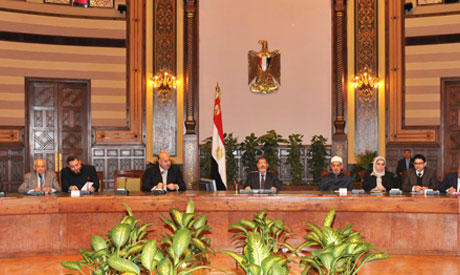
Egypt's President Mohamed Morsi (C) attends a meeting with Egypt's Vice President Mahmoud Mekky (4th L) with other politicians and heads of parties at the presidential palace in Cairo December 8, 2012 (Photo: Reuters)
The presidential office on Thursday announced that the third phase of the national dialogue headed by Vice President Mahmoud Mekki would take place Thursday afternoon.
In a press release, the presidency announced that it would hold two meetings. The first will be held with the committee of experts, headed by Constituent Assembly member Selim El-Awa, in order to discuss contentious articles of the draft constitution that might be re-drafted.
The referendum on the draft constitution will kick off Saturday, with a second phase taking place on 22 December. Contentious articles may be discussed by members of parliament's lower house after general elections are held, if the constitution passes.
The meeting will also discuss nomination criteria for the one third of Shura Council (upper house of parliament) members who are to be appointed by the president. The committee of experts is set to draw up criteria to be agreed upon by all factions in the dialogue. These will then be presented to Morsi by moderate-Islamist Wasat Party leader Abul-Ela Madi.
This is set to take place following the referendum, as legislative powers will be vested in parliament and no longer be in the hands of the president, as is currently the case. The People's Assembly was dissolved in June following a High Constitutional Court ruling that ruled that one-third of its members had been chosen on an unconstitutional basis.
Following the meeting of experts, the minutes of the meeting will be shared and what was agreed upon announced to the public. So far, it has been unclear who exactly has attended the meetings.
The statement by the presidential office added that the meeting aimed to achieve the "greatest level of national consensus."
On Saturday, following three days of violent clashes between pro-Morsi supporters and opposition activists over the 22 November constitutional decree and the draft constitution, Egyptians will vote in a national referendum. The national dialogue meetings are an attempt to end the discord that has led to the deaths of at least seven protesters with hundreds injured.
Opposition attendance, however, has been feeble so far, with the majority refusing to attend. The National Salvation Front, the main opposition group led by founder of the Constitution Party Mohamed ElBaradei and former presidential candidates Hamdeen Sabbahi and Amr Moussa, was among those who refused to attend.
Those who attended included Al-Azhar Sheikh Ahmed El-Tayeb, former Islamist presidential candidate Mohamed Selim El-Awa, Salafist Nour Party chairman Emad El-Din Abdel-Gafour, Ghad El-Thawra Party founder Ayman Nour, moderate-Islamist Wasat Party leaders Abul-Ela Madi and Essam Sultan, and Gamal Gebril, chairman of the Constituent Assembly's system-of-government committee.
Also attending were Islamic preacher Amr Khaled; Al-Ahram columnist Fahmy Howeidy; Montasser El-Zayat, a well-known lawyer for Islamist groups in Egypt; Egypt's top publisher Ibrahim El-Moalem; and former head of the now-dissolved People's Assembly's legislative committee, Mahmoud El-Khodairy.
Following the meeting, the controversial constitutional declaration announced 22 November by President Morsi was rescinded. The decree shielded his decisions from judicial review and protected the Islamist-dominated Constituent Assembly and upper house of parliament (the Shura Council) from dissolution.
A second meeting by the committee was held Tuesday.
The new constitutional declaration announced in its place is immune to legal challenge as Morsi, in office for around five months, sought to avoid a fresh impasse.
Bloodshed over the constitution and political divisions experienced since 22 November have largely been attributed to the Muslim Brotherhood's dictatorial practices since Morsi's ascent to power, including limiting many freedoms in the draft charter.
Morsi's supporters, however, claim that the holding of the referendum on schedule, starting on Saturday, is the legitimate way to achieve revolutionary goals and end the current period of political transition.
Short link: